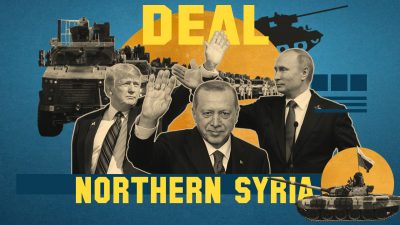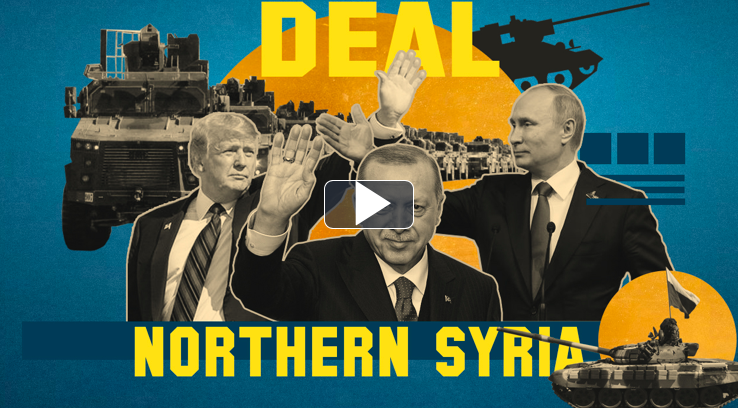Video: Syrian Kurds’ Protection Deal with Assad Explained

The Kurdish-led Syrian Democratic Forces (SDF) have reached a groundbreaking deal with the Assad government.
This happened on October 13 evening after the US-led coalition expectedly abandoned their ‘local partners’ in face of Turkey’s Operation Peace Spring and an ‘accident Turkish shelling’ of a US military garrison near Kobani. Turkey is a NATO member state and a key US ally in the eastern Mediterranean. Ankara considers the SDF to be a terrorist group linked to the Kurdistan Workers’ Party. So, it was hard to expect that the US would really fight the Turks on behalf of the Syrian Kurds.
Units of the Syrian Army already deployed in Manbij, Tabqah, Tabqah Dam, Ain Issa and other key areas in eastern Aleppo, western al-Hasakah and southern Raqqah. Russia, which was the main mediator between the SDF and Damascus, also sent its military police to Manbij. Official details of the agreement are yet to be revealed and all the sides involved in the northeastern Syria standoff seem to have own versions of events.
The SDF and affiliated Kurdish political organizations say that the deal with the Assad government was a least-evil solution and it was related to the defense sphere only. A political agreement still has to be reached and the sides are going to start negotiations in the coming days. SDF sources see Russia as a guarantor of the agreement and the only power that is able to prevent the further Turkish incursion into northeastern Syria. According to this version, the Syrian Army will be deployed along the Turkish border and its presence there will guarantee Syrian territorial integrity. The areas captured by the Turkish military and pro-Turkish groups will remain a zone of military actions until their liberation. They name the liberation of the Turkish-controlled region of Afrin as one of the points of the agreement. Sources close to Damascus say that the SDF will have to hand over to the government the control of oil fields on the eastern bank of the Euphrates.
In the political sphere, the Kurdish People’s Protection Units (YPG) and the Kurdish Democratic Union Party (PYD), the only real military political power within the SDF, will seek to get recognition of their self-proclaimed Autonomous Administration of North and East Syria by Damascus. The format of this recognition and a possible Kurdish autonomy will depend on the course of negotiations and the development of the Turkish offensive.
The Syrian government has not released official comments on the deal with the SDF so far. The Syrian Army is also not hurrying up to start a fully-fledged war with Turkey on behalf of the SDF. In these conditions, the best strategy is to block directions of possible Turkish-led advance rather than engage the Turkish Army and Turkish proxies in an open battle. This turns the Turkish advance in northern Syrian into a race against time, whose main goal is to capture as much area as possible, while the Syrian Army has not come. The situation in Manbij is a demonstration of this approach:
On October 14, the Syrian National Army, a coalition of Turkish-backed armed groups, officially announced the start of advance on Manbij. However, no real advance happened, because the Syrian Army and the Russians came.
The Turkish behavior demonstrates that Anakra knows the rules of this game. On October 15, President Recep Tayyip Erdogan said that the operation was ongoing successfully and Turkish forces ‘liberated’ 1,000km2. Erdogan added that his country aims to clear northern Syria of ‘terrorists’ (i.e. Kurdish armed groups) stretching from Manbij to the Iraqi-Turkish border. Nonetheless, this is just an official rhetoric that should not fully comply with the real actions. Turkey will likely gain control of the area between Tell Abyad and Ras al-Ayn, and the M4 highway south of these towns. What really matters is who will get control of the city of Ayn al-Arab (Kobani). In the current conditions, Ayn al-Arab is the only area, where clashes between the Syrian Army and Turkish-led forces can start if they reach it simultaneously. The fate of the town will likely be determined by some kind of behind the scenes deal among Ankara, Moscow and Damascus. At the same time, all the sides will continue to employ their formal rhetoric as if such a deal has never existed.
In own turn, US President Donald Trump used the Turkish operation to deliver his repeatedly delayed promise to withdraw American troops from the war-torn country, at least formally. US forces indeed abandoned their military garrisons in northern Syria about 1,000 personnel are withdrawing. However, the reduced contingent of about 150 troops will remain in place in the al-Tanf area as a part of Trump’s anti-Iranian strategy in the region. The US does not want the Damascus-Baghdad highway to be used by Iran to supply its allies in Syria and Lebanon. Additionally, the US-Israeli bloc uses the al-Tanf base to project its power on the Syrian-Iraqi border and monitor supposed Iranian operations in the area.
Another factor behind the US move is the need to improve its relations with Turkey. US military support to Kurdish armed groups in Syria used to be a factor of constant tension in the relations between Washington and Ankara. Now, it is removed. A new round of anti-Turkish sanctions announced by President Trump is mostly a formal move aimed at the US internal audience.
Meanwhile, the United States and Russia blocked attempts of the UN Security Council to condemn Turkey’s military action in northeastern Syria. If this was really a part of some unpublicized coordination, key powers involved in the conflict may be on the edge of reaching a long-expected wide political deal on settling the conflict in Syria.
*
Note to readers: please click the share buttons above or below. Forward this article to your email lists. Crosspost on your blog site, internet forums. etc.
We call upon Global Research readers to support South Front in its endeavors.
If you’re able, and if you like our content and approach, please support the project. Our work wouldn’t be possible without your help: PayPal: [email protected] or via: http://southfront.org/donate/ or via: https://www.patreon.com/southfront


